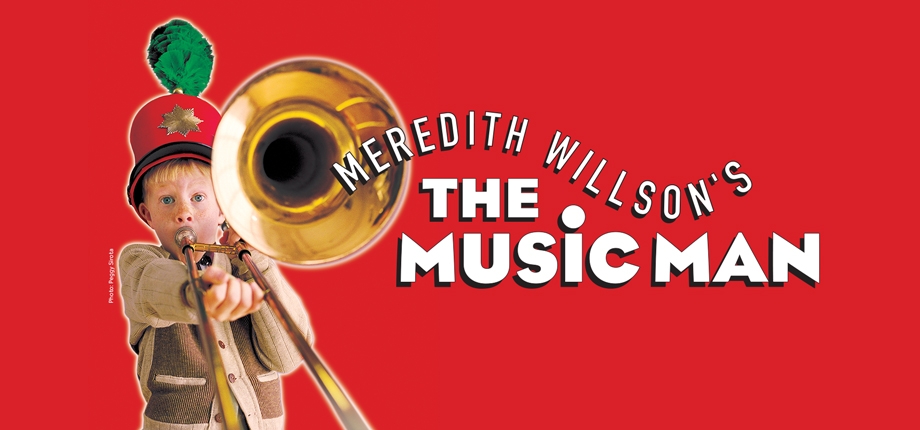Filichia Features: The Music Man: Sixty Years Strong

Filichia Features: The Music Man: Sixty Years Strong
"You know which one we should've had a piece of? The Music Man, that's what."
I can still hear Cy Feuer saying that to me in 2001 with his face showing so much sincerity that you wouldn't have doubted him for a second.
Indeed, from late 1953 through early 1956, Feuer and his co-producing partner Ernest H. Martin had an option to produce newcomer Meredith Willson's musical about a huckster who comes to a small Iowa town and bilks parents into buying band equipment and uniforms for their sons.
What never occurs to them is that this band won't ever exist.
Feuer and Martin saw it as their next success. How could they think otherwise considering that they'd produced five shows and all had become hits? They ranged from Guys and Dolls (which finished as the third-longest running book musical in Broadway history) to Silk Stockings, which may not be a classic but had still lasted more than a year. (Back then, 478 performances was pretty impressive.)
Willson wanted to do book, music and lyrics - a trio of jobs that one person usually didn't (or couldn't) do. So Martin said he'd co-write the book, which Willson reluctantly accepted. Eventually Willson's idea of having young Winthrop in a wheelchair changed to him having a lisp.
Meanwhile, Feuer was planning to direct, which he'd never before done on Broadway. That wasn't music to The Music Man's creator's ears.
So eventually Feuer and Martin said grandly to Willson that they weren't going to do the show and that he owed them nothing for their time and suggestions. That's what producers often say when they believe the project they're dropping is never going to amount to anything. Why not be gracious about a show that will forever go unproduced?
And yet, here we are, sixty years to the week that The Music Man opened and was called "the one you've been waiting for," "a solid hit," "much fun," "imaginative, witty, expert and undeniably amusing smash hit," "marvelous," "beautifully fresh," "easily the brightest, breeziest, most winning new musical" and "it should be easily twice as long or should be performed twice at every performance" from eight different New York daily newspaper critics.
Meanwhile, Feuer and Martin were seething while developing Whoop-Up. Some of you may (understandably) ask "What's that?" Answer: a musical of a novel called Stay Away, Joe. And if you're saying, "Funny, that's the name of an Elvis movie," indeed Whoop-Up was based on the same novel a decade before Presley took to the screen.
Whoop-Up ran 56 performances to The Music Man's 1,375. Its producer Kermit Bloomgarden had mainly mounted hit dramas (Death of a Salesman; The Crucible; The Diary of Anne Frank) but his first musical success -- The Most Happy Fella - made him amenable to another. He and director Morton Da Costa took a chance on a lesser known actor named Robert Preston. The Music Man would make him a Broadway powerhouse for the next quarter-century.
How potent was The Music Man's reach? In the 1960 Oscar-winning Best Picture The Apartment, executive Jeffrey Sheldrake is willing to trade his theater tickets to Chuck Baxter in exchange for the use of his apartment. When Chuck asks the name of the show, Sheldrake says "The Music Man - what else?"
Also playing at that time were My Fair Lady, The Sound of Music, West Side Story, Gypsy, Bye Bye Birdie, Flower Drum Song, Once Upon a Mattress and Fiorello! But the screenwriters believed the national audience would recognize The Music Man as the outstanding current hit and a white-hot ticket.
Whenever I meet a musical theater enthusiast, I always ask the same questions: "What hit do you love that everyone hates?" "What flop that everyone hates do you love?" The answers are rarely the same from anyone, but when I ask "What scene in a musical makes you cry?" I often hear "The Act One finale of The Music Man."
You bet! All act long, we've seen little Winthrop so miserable because he's fatherless and has a lisp. Suddenly Harold Hill has made him a member of a boy's band, gives him a shiny cornet to play and the lad suddenly comes alive. Only the hardest of hearts wouldn't weep openly with happiness.
As for a Harold Hill, remember that Robert Preston hadn't much of a reputation until The Music Man made him a star. Perhaps there's a man in your company that hasn't done a musical and would turn out to be as felicitous a surprise.
You may e-mail Peter at pfilichia@aol.com. Check out his weekly column each Monday at www.broadwayselect.com and Tuesday at www.masterworksbroadway.com . His book, The Great Parade: Broadway's Astonishing, Never-To-Be Forgotten 1963-1964 Season is now available at www.amazon.com.

























